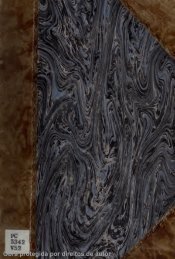Espaços e Paisagens - Universidade de Coimbra
Espaços e Paisagens - Universidade de Coimbra
Espaços e Paisagens - Universidade de Coimbra
You also want an ePaper? Increase the reach of your titles
YUMPU automatically turns print PDFs into web optimized ePapers that Google loves.
THE NATURAL ORIGINS OF GREEK ART AND CULTURE.<br />
GREEK LANDSCAPE AND THE GREEK BRAIN<br />
Keywords: Greek art, Greek brain, Greek culture, Greek landscape.<br />
Palavras-chave: arte grega, cérebro grego, cultura grega, paisagem grega.<br />
John onians<br />
University of East Anglia<br />
All Classicists know that the Greeks were distinguished for their interest<br />
in nature. They themselves are usually distinguished for their lack of interest<br />
in it; though that is not true of the organizers of this volume. Most Classicists<br />
study Greek natural philosophy and the naturalism of Greek art, but, in<br />
their explanation of them, they almost never themselves invoke nature. In<br />
this they are unlike their pre<strong>de</strong>cessors. In Antiquity the Hippocratic corpus<br />
and Strabo were in agreement that, following humoural theory, the main<br />
<strong>de</strong>terminants of culture were climate and landscape. Thus the reason why<br />
the Athenians were more intelligent than the Boeotians was because their<br />
air was not moist and foggy, but dry and clear. In the eighteenth century,<br />
Winckelmann thought that Greek culture was fundamentally shaped by the<br />
climate and the influence it had on their brain, which he thought had finer fibres<br />
than those of the Egyptians and Persians. In the nineteenth, Hippolyte Taine<br />
agreed with ancient writers in claiming that the clarity of the Athenian<br />
air and the prismatic forms of their mountains played a crucial role in<br />
the emergence of the Athenian intellectual and aesthetic achievement.<br />
Such claims have ten<strong>de</strong>d to be treated as a joke by serious scholars, but<br />
now the joke is on them. Mo<strong>de</strong>rn biology suggests that these neglected<br />
claims were essentially correct, although the basis for this opinion is not,<br />
of course, humoural theory, but neuroscience. In other words, while until<br />
recently anyone who argued that nature had an important role in shaping<br />
Greek culture would have been laughed at, we should now laugh at anyone<br />
who <strong>de</strong>nies it. And surely, however skeptical we are, since the Greeks<br />
themselves were so interested in natural explanations we owe it to them<br />
to take such explanations seriously, which is why, in the next twenty five<br />
minutes, I intend to sketch out my own view of the way an un<strong>de</strong>rstanding<br />
of the relation between two aspects of nature, the Greek brain and the<br />
Greek landscape, helps us to un<strong>de</strong>rstand some of the most vital Greek<br />
achievements.<br />
Since my argument may be unfamiliar to most of you I will first quickly<br />
outline its basis. I rely on two facts, one, the distinctive nature of the Greek<br />
landscape, and two, the distinctive nature of the Greek brain. For the Greek<br />
landscape was essentially different from that of all other areas of the world<br />
Obra protegida por direitos <strong>de</strong> autor<br />
13

















